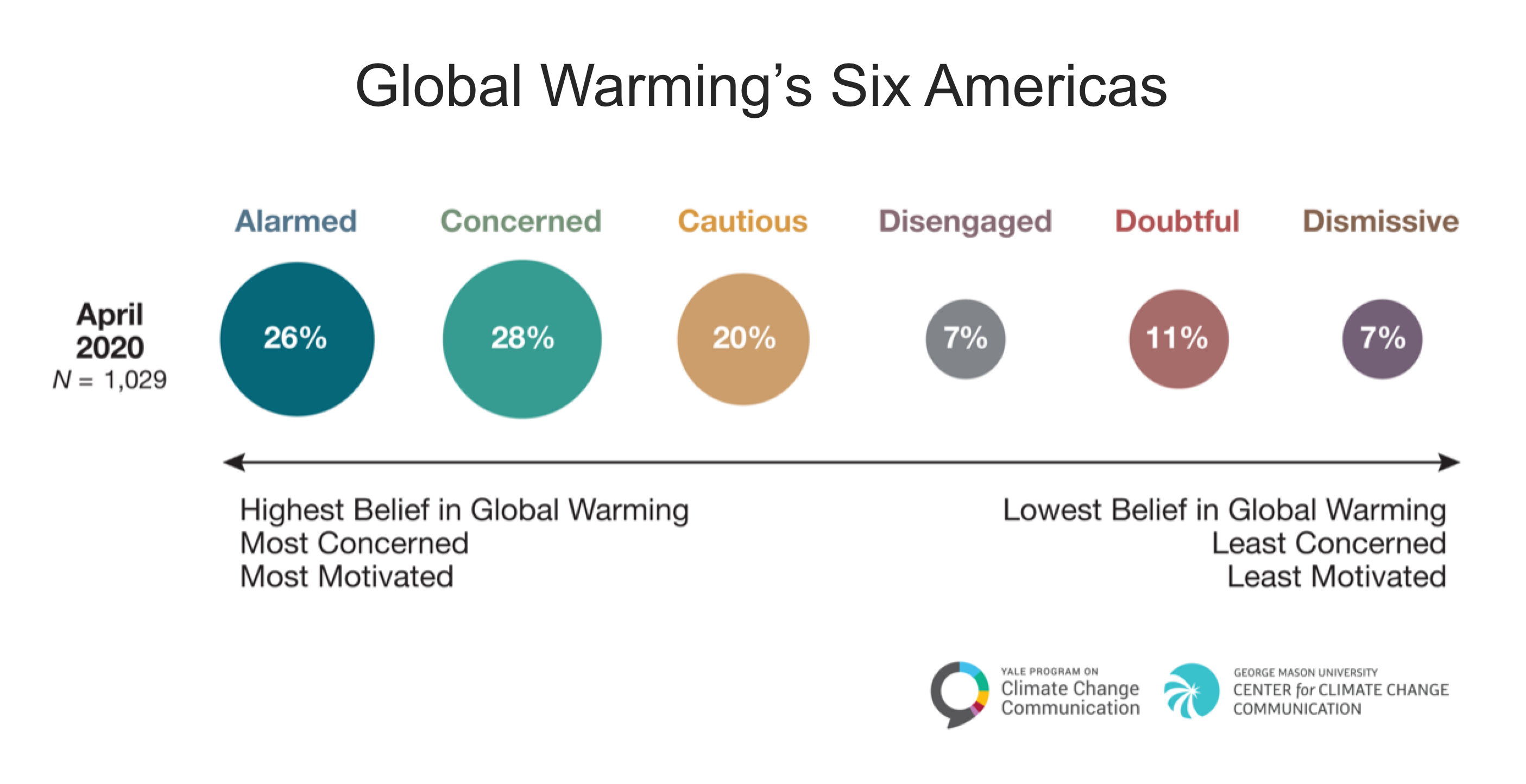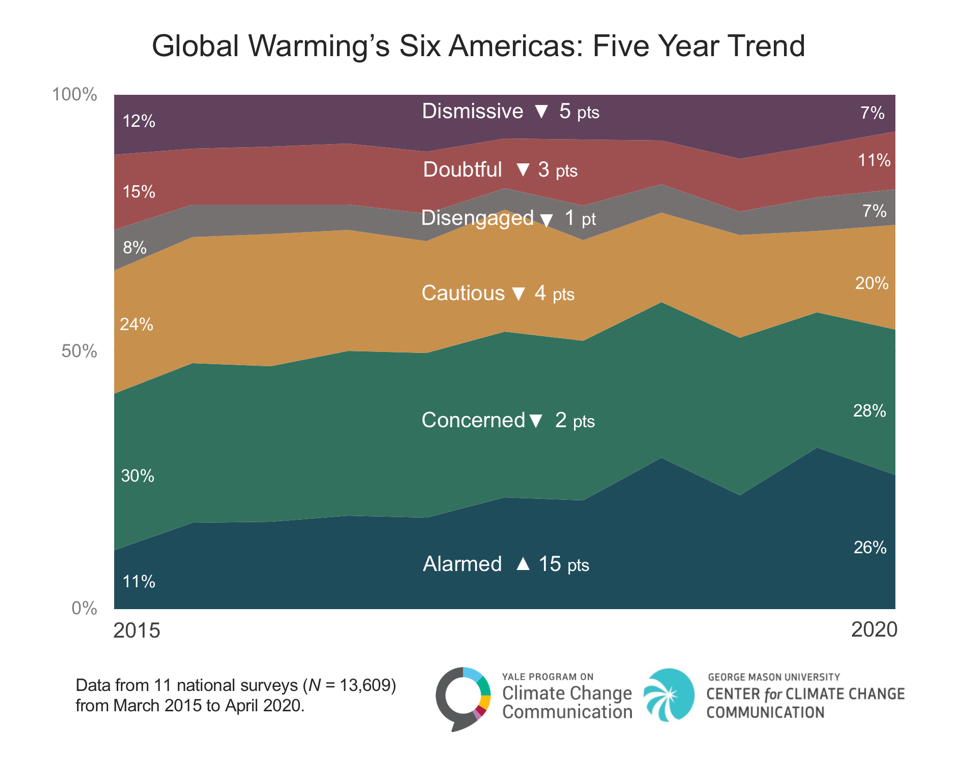Climate Note · Oct 10, 2020
Global Warming’s Six Americas in 2020
By Anthony Leiserowitz, Jennifer Marlon, Xinran Wang, Parrish Bergquist, Matthew Goldberg, John Kotcher, Edward Maibach and Seth Rosenthal
Filed under: Beliefs & Attitudes
Our prior research has found that Americans can be categorized into six distinct groups—Global Warming’s Six Americas—based on their beliefs and attitudes about climate change.
The Alarmed are the most engaged, are very worried about climate change, and strongly support actions to address it. The Concerned think global warming is a significant threat, but prioritize it less and are less motivated to take action. The Cautious are aware of the warming but are uncertain about its causes and are not worried about it. The Disengaged are largely unaware of global warming, while the Doubtful doubt it is happening or human-caused and perceive it as a low risk. The Dismissive do not believe the planet is warming or that it is human-caused. They oppose most climate policies.
Today, the Alarmed (26%) outnumber the Dismissive (7%) nearly 4 to 1. More than half (54%) of Americans are either Alarmed or Concerned, while the Doubtful and Dismissive are only 18% of the population. However, because conservative media organizations prominently feature Dismissive politicians, pundits and industry officials, most Americans overestimate the prevalence of Dismissive beliefs among other Americans.
The Six Americas Over Time
There has been a significant change in the distribution of the Six Americas over the past five years. The Alarmed segment has more than doubled in size (from 11% to 26% of the U.S. adult population), while the Dismissive segment has decreased by nearly half (from 12% to 7%). Overall, Americans are becoming more worried about global warming, more engaged with the issue, and more supportive of climate solutions.
A look back at how the Six Americas have changed over the past decade shows that the largest group, the Concerned, grew quickly from 2013 to 2015, but has declined slightly since then. The Alarmed, in contrast, experienced more rapid growth during the past five years than any of the other groups. Meanwhile, the Cautious, Doubtful, and Dismissive have been shrinking in recent years.
Communication Challenges
Momentum in Americans’ understanding of global warming’s reality, risks, and solutions is building. The growth of the Alarmed segment, in particular, is an encouraging sign because progress on climate change requires strong, coordinated, and sustained action, and the Alarmed are the most engaged with the issue. Yet, more organization and mobilization are still needed. The Concerned and Cautious (who comprise nearly half of U.S. adults) tend to see climate change as primarily a future problem because many are unaware that global warming is already harming communities across America–including increasingly dangerous weather, growing impacts on human health, and rapidly increasing economic disasters due to fires and storms. Despite this continued misunderstanding, however, there is also a growing consensus–across party lines–that 100% clean energy is the right path for American prosperity.
Resources and Data
The Six Americas Short Survey Yay! (SASSY!), a short, four-question online quiz allows users to determine which segment of the Six Americas they belong to (Chryst et al., 2018). Quiz results also show how the respondent’s views about global warming compare with other Americans.
The SASSY Group tool enables the upload of one’s own data (e.g., from a class, one’s own survey, members of an organization, etc.). The tool will calculate the Six Americas segment for each individual in the dataset using their responses to the four SASSY questions, which is then added as a new column to a spreadsheet, which can then bee download. The tool also provides summary graphics depicting the responding group’s Six Americas composition and how it compares with Americans overall.
The Six Americas data are from the biannual Climate Change in the American Mind surveys conducted in partnership with our colleagues at the George Mason University Center for Climate Change Communication.
Methods
These data were produced from the Climate Change in the American Mind survey, a nationally-representative survey of public opinion on climate change in the United States conducted by the Yale Program on Climate Change Communication and the George Mason University Center for Climate Change Communication. Surveys were conducted from January 2010 to April 2020 using the Ipsos KnowledgePanel® (formerly GfK), a representative online panel of U.S. adults (18+). All questionnaires were self-administered by respondents in a web-based environment.
Average margin of error for each wave: +/- 3 percentage points at the 95% confidence level. Percentage values are weighted to align with U.S. Census parameters. For tabulation purposes, percentage points are rounded to the nearest whole number. Additionally, summed categories (e.g., Alarmed + Concerned) are rounded after sums are calculated (e.g., 31.4% + 26.2% = 57.6%, which, after rounding would appear in this report as 31% + 26% = 58%).

